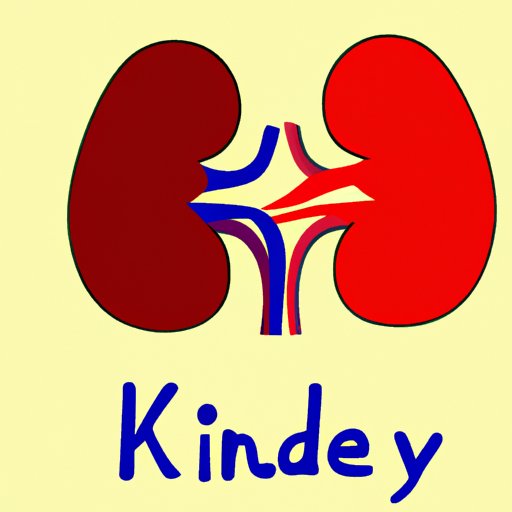
Introduction
Many of us take our kidney function for granted, but these small and mighty organs play a crucial role in filtering waste and excess fluids from our bodies. For many of us, having two kidneys is the norm, but there may be certain situations where one kidney is all we have.
In this article, we’ll dive into the world of living with one kidney, discussing everything from organ donation and transplantation to the lifestyle changes that may be necessary. Whether you have one kidney or are simply curious about the topic, read on to learn more.
The Truth About Having One Kidney: Is it Enough for a Healthy Life?
In certain cases, people may be born with just one kidney or have to have one removed due to a medical condition. While this may seem daunting, the good news is that our kidneys are incredibly adaptable organs that can compensate for the missing kidney.
According to the National Kidney Foundation, living with one kidney is typically not a problem for healthy individuals. In fact, many people who donate a kidney to a loved one or stranger go on to lead normal, healthy lives with just one functioning kidney.
However, it’s important to note that there can be some potential risks and challenges associated with living with just one kidney. These may include a higher risk of developing high blood pressure or chronic kidney disease, as well as complications during pregnancy.
Despite these potential challenges, it’s estimated that around 1 in 750 people live with just one kidney, and many do so without any issues or complications.
Kidney Donation: The Gift of Life with One Kidney
Living with just one kidney is not only possible but can also be an incredible gift for those in need. Kidney donation and transplantation is a common procedure where a healthy individual donates one of their kidneys to someone in need of a transplant.
For those donating a kidney, the good news is that people can function normally with just one kidney. The remaining kidney will compensate for the missing one, and studies show that people who donate a kidney have a life expectancy that is similar to that of people with two kidneys.
The benefits of organ donation extend far beyond just the recipient. Donors often experience an immense sense of fulfillment and satisfaction from knowing that they have played a vital role in saving someone’s life. In some cases, organ donation can even help with the healing process after the loss of a loved one.
There are countless stories of kidney donors who have had their lives forever changed in a positive way by their selfless act of donation. From being able to see their grandchildren grow up to feeling a sense of purpose and accomplishment, the benefits of organ donation can extend far beyond the physical act itself.
Surviving with a Single Kidney: What You Need to Know
If you are living with just one kidney, there are certain lifestyle changes that may be necessary to ensure optimal kidney health. This may include maintaining a healthy diet, staying hydrated, avoiding certain medications, and regularly monitoring kidney function through blood and urine tests.
Staying active and maintaining a healthy weight can also be important for kidney health, as obesity can increase the risk of kidney disease. Additionally, quitting smoking can help reduce the risk of kidney disease and other related health issues.
Regular checkups with a healthcare provider are also essential for monitoring kidney function and addressing any potential issues or concerns early on.
One Kidney Wonder: Living a Full Life with Half the Organs
Living with just one kidney doesn’t have to be a setback. Many individuals who are thriving with one kidney have found success through healthy habits, strong support systems, and a positive mindset.
Some tips for living a full life with just one kidney may include staying active and engaging in hobbies or activities that bring joy, staying on top of regular checkups and lab work, and finding support from other individuals who are living with one kidney, whether through online communities or local support groups.
It’s inspiring to hear about the success stories of those living with just one kidney. Take Lauren Timko, for example, a kidney transplant recipient who went on to compete in marathons and Ironman triathlons, or Aimee Gann, who donated a kidney to her mother and went on to complete a 70.3-mile triathlon.
What’s the Deal with Two Kidneys? Do We Really Need Both to Survive?
While we’ve explored the scenario of living with just one kidney, it’s worth taking a moment to discuss why we have two in the first place.
Our kidneys play a crucial role in filtering our blood and removing waste and excess fluids from our bodies. Having two kidneys provides a backup system, meaning that if one kidney becomes damaged or overloaded, the other can step in and take over.
It’s also worth noting that having two kidneys can increase the body’s ability to filter blood and maintain fluid balance, which can be especially important for athletes or individuals with certain medical conditions.
Conclusion
Living with just one kidney can seem daunting, but the reality is that many individuals are able to lead happy, healthy lives with just half the number of organs. Whether you are considering organ donation or are simply curious about the topic, it’s important to stay informed and take steps to maintain optimal kidney health.
By staying active, maintaining a healthy diet, and regularly monitoring kidney function, among other steps, individuals with just one kidney can continue to thrive and enjoy life to the fullest.
If you are living with just one kidney or are interested in learning more about kidney health, be sure to consult with a healthcare provider for personalized recommendations and guidance.





